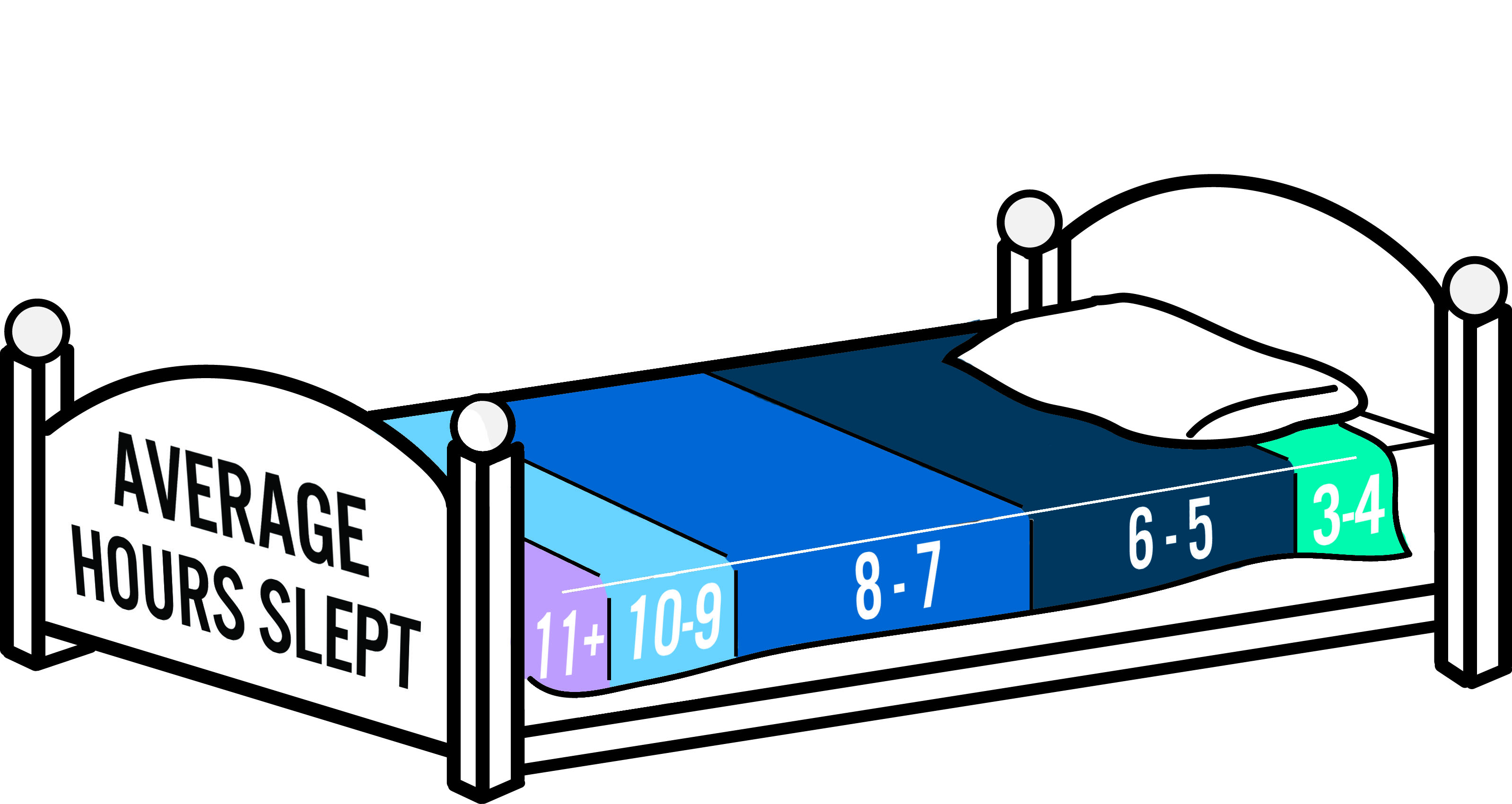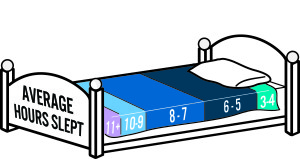

By: Katie Auwaerter | Asst. Features Editor
While making friends and experiencing life lessons is a large part of the experience, students don’t go to college to get our beauty sleep.
We are here to earn a degree. We are here to learn the skills necessary for a career we’re passionate about. However, sleep is often sacrificed in order to cram that information into our brains.
Fueled by Starbucks and nights at the library, these all nighters may actually be doing more harm than good.
A recent study from Journal of Neuroscience on March 20 shows that extended wakefulness may lead to a loss of brain cells. Researchers at the University of Pennsylvania put mice under an irregular sleep schedule to see the effects on the mechanics of the brain.
Researchers found that 25 percent of the locus coeruleus was permanently damaged. This area of the brain is responsible for alertness and cognitive thinking, and it gets hit hard with those all nighters. But what many don’t realize is that no amount of sleep binging will be able to fix the damage done, according to the study.
Though this is the first study to show the irreversible damage due to lack of sleep, scientists have known for a while that lack of sleep isn’t good for your brain.
A study conducted by professor of neuroscience Matt Wilson at Massachusetts Institute of Technology in 2008 showed that the brain replays events and re-learns during sleep. Cells in the hippocampus, an area of the brain, pay attention to events during the day. When asleep, these same cells review the information gathered. By starving the body of sleep, you starve it of the ability to reinforce what you learn.
In 2012, researchers at the University of Rochester Medical Center found that while you sleep, your cerebrospinal is flushed, which is an energy-intensive process that can’t be done while awake. This process removes waste and toxins that play a role in brain disorders.
John Pollock, a professor in the department of biological sciences at Duquesne, has taken a deeper look at why sleep is good for the brain. Working with WQED Pittsburgh, Pollock created Scientastic, a show for teens that takes science and makes it fun, with this Sunday’s episode being “Are You Sleeping? Dorrmez Vous?” Through the story of a young girl staying up late to study for an exam, teens can learn why an all-nighter might not result in an “A.”
While the show may be aimed at a younger audience, Pollock says that the message is important for college students as well, who try to compensate for the lack of sleep with caffeine.
“For learning, for your athletic ability, for your emotional stability, you need to get sleep. When we use caffeine, we sometimes think ‘oh wow, I’m wide awake and I don’t need to sleep anymore,’ but all that you’ve done is biochemically tricked the brain into thinking it’s not drowsy anymore when in fact it’s still very drowsy. And parts of the brain will literally go to sleep on their own while you think you’re still awake, which is what we call ‘spacing out,’” Pollock said.
But sleep isn’t just important for your mind; your body needs it as well.
Nancy Generalovich, campus relations coordinator and staff nurse at Duquesne’s Health Service, explains that students at Duquesne aren’t getting the amount of sleep they need, which can lead to a weakened immune system.
“An adequate amount of sleep for this age would be eight to nine hours a night, which we know students aren’t getting. This affects your metabolism and weakens your immune system and when your immune system is weakened, that’s when health problems creep up,” Generalovich said.
Generalovich also said weight gain can be a problem because people who are awake longer tend to eat more to keep their bodies going.
Psychology professor Anthony Barton explains sleep can be a healing experience for many different psychological conditions.
“In general, when people come for therapy with anxiety, with depression, and so on and very often you find that one of the aspects of it is that they have trouble sleeping or they have nightmares when they sleep,” Barton said.
Another vital aspect of sleep is dreaming, which allows a person to work out the emotional and dramatic aspects of life, according to Barton.
“If you’re dealing with the loss of a person or you’re dealing with transitional things in your life, in the process of sleeping you dream and you’re working out these things in a dream way; you’re knitting together things psychologically,” Barton said.
According to a survey The Duke conducted of 100 students, 42 percent of students said they get between five to six hours of sleep a night, with 7-8 hours of sleep second at 40 percent. Based on the students polled, students are not getting the recommended amount of sleep for the age mentioned previously.
But what’s keeping us up at night? While students cited many reasons, from Netflix to procrastination, the biggest reason students are staying up for homework or studying.
So while we’re trying to grow our brains with information for exams and papers by staying up late, we’re killing it at the same time. What can be done without sacrificing one for the other?
According to Duquesne Health Service, it’s simple; make sleep a priority. By balancing your study and sleep time, you can improve more than just your academic performance; getting a healthy amount of sleep can leave you feeling healthier and happier as well. While we might not be here for beauty sleep, a little more sleep for the brain and body might help us to our end goal of graduation.
What can we do to get more sleep?
POWER NAP! Naps are better than caffeine at giving you an energy burst, if you do it correctly. Nap before 3 p.m. so you won’t interfere with your normal sleep schedule and keep it between 15 to 20 minutes. Napping longer than 20 minutes will leave you feeling groggy, but a shorter nap will refresh you and keep you going.
Exercise! By exercising in the afternoon, you improve your ability to fall asleep, but make sure you complete your exercise two hours before you go to sleep.
Use your bed for sleep ONLY! If you watch TV, study or surf the web while in bed, your body won’t think it’s an area for sleep. To avoid sending your body mixed signals, save your bed for bedtime!





I thought it was some fine facts, we’ll I thought so! It helped me with a project I had to do, so thank you very much! Oh, did I mention how I loved this? Well, if I didn’t I really do love all this stuff, I will say it again. Thank You!
Good Topic
I Like it
Now i can discusse with their who prefers night to live
Allah Bless You
I couldn’t agree more with using your bed for sleeping only. It’s too easy to get caught up in watching TV or playing games on your phone rather than getting the sleep that you need. For exercise, I’ve found that yoga is a great way to get the exercise I need and help my body to relax to prepare for a good night’s sleep.
Well said .. Keeping the sacredness of a place is very beneficial , restrict yourself to only sleep when u go on the bed and avoid other activities in that place . This will create its own effect of making you sleep at that place
In yoga the best exercise are “surya Namaskar” and “Padma sadhana” both are mind and body healing . Just try it for 3-4 days and note the stability in yourself:)